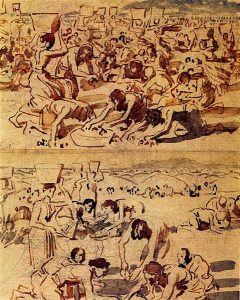Exodus 16:2-15
This text is used for the Lectionary Year A on September 24, 2017.
 In the article, Exodus 16 as an Alternative Social Paradigm, Ann Fritschel introduces an analogy of the Israelites’ wilderness experience to a liminal experience. Taken from the Latin word for ‘threshold,’ liminal is defined as an ‘in-between place,’ a rite of passage as one moves from childhood to adulthood. With the aforementioned in mind, perhaps the actions of Israel are more plausible as we witness a continual disconnect between expectation and application of God’s commands. In Exodus 15, the Israelites take a praise break and worship the LORD that brought them up out of Egypt and through the Red Sea on dry land. It’s not long though, in fact just a month from their miraculous aquatic-based deliverance, before the Israelites piggy back on their earlier disposition of complaining while living in the wilderness. The initial murmuring motif raises its head again in Exodus 15:22-27 when the Israelites are grumbling for the need to quench their thirst. Even after God directs their feet to an abundance of springs and shade trees, the tension of living in-between reappears even in our pericope.
In the article, Exodus 16 as an Alternative Social Paradigm, Ann Fritschel introduces an analogy of the Israelites’ wilderness experience to a liminal experience. Taken from the Latin word for ‘threshold,’ liminal is defined as an ‘in-between place,’ a rite of passage as one moves from childhood to adulthood. With the aforementioned in mind, perhaps the actions of Israel are more plausible as we witness a continual disconnect between expectation and application of God’s commands. In Exodus 15, the Israelites take a praise break and worship the LORD that brought them up out of Egypt and through the Red Sea on dry land. It’s not long though, in fact just a month from their miraculous aquatic-based deliverance, before the Israelites piggy back on their earlier disposition of complaining while living in the wilderness. The initial murmuring motif raises its head again in Exodus 15:22-27 when the Israelites are grumbling for the need to quench their thirst. Even after God directs their feet to an abundance of springs and shade trees, the tension of living in-between reappears even in our pericope.
From an exegetical perspective, Exodus 16:2-15 is a rich reservoir for exploration, a gold mine for excavation. While there exists much scholarly debate about sources and literary form, one thing is for certain, our text parallels a traditional pattern of murmuring found in Numbers 14 and 16. Simply put, the people murmur, a conflict occurs, and a theophany combined with a divine word for Moses provides instructions for relaying to the people. Within the text, we find the manna and quail traditions (believed to exist independently) combined to relay an intended message to its hearers that differ from its counterparts in Numbers 11 and Psalm 78. Exodus 16 maintains the tension of the two aforementioned accounts. On the one hand, we witness the gracious provisions of God through the manna and quail. On the other hand, Israel’s disobedience is clearly visible even in the absence of judgment by God.
